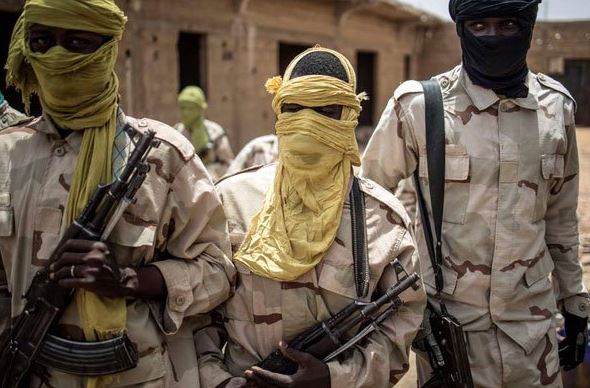Bamako: A military camp in Mali’s restive north was attacked Friday, a day after two separate assaults by al-Qaida-linked insurgents killed 49 civilians and 15 government soldiers, the military said.
“Response and evaluation in progress,” the armed forces said in a brief statement about Friday’s attack on a Malian military camp in the Gao region.
Thursday’s attacks targeted a passenger boat near the city of Timbuktu on the Niger River and a military position in Bamba further downstream in Gao, the military junta said in a statement read on state television.
It said responsibility for the attacks was claimed by JNIM, an umbrella coalition of armed groups aligned with al-Qaida. The group issued a statement Friday saying it also attacked the military camp.
The Niger River serves as an important transportation route in Mali, where roads are inadequate.
Mali is ranked the sixth least developed nation in the world, according to the United Nations human development index. Nearly half of the West African country’s 22 million people live below the national poverty line. The situation is worse in rural areas where deadly jihadi attacks have threatened subsistence farming — many peoples’ only real option for making money.
Thursday’s attack targeted a triple-decker passenger boat near the village of Zarho, about 90 kilometres east of Timbuktu. The statement said the government killed about 50 assailants while responding to the attacks. It declared three days of national mourning to honour the civilians and soldiers killed in the attacks.
Malian army spokesman Souleymane Dembélé attributed the high death toll to the inability of some of the boat’s passengers to swim, suggesting some might have drowned.
“When the boat was attacked, the soldiers on board exchanged fire with the terrorists. Unfortunately, many civilians who couldn’t swim jumped into the water,” Dembélé told The Associated Press.
Al-Qaida-affiliated and Islamic State-linked groups have almost doubled the territory they control in Mali in less than a year, the United Nations said in a report last month, as they take advantage of a weak government and of armed groups that signed a 2015 peace agreement.
The stalled implementation of the peace deal and sustained attacks on communities have offered the IS group and al-Qaida affiliates a chance “to re-enact the 2012 scenario,” the report said.
That’s the year when a military coup took place in the country and rebels in the north formed an Islamic state two months later. The extremist rebels were forced from power in the north with the help of a French-led military operation, but they moved from the arid north to more populated central Mali in 2015 and remain active.
In August 2020, Mali’s president was overthrown in a coup that included an army colonel who carried out a second coup and was sworn in as president in June 2021. He developed ties to Russia’s military and Russia’s Wagner mercenary group whose head, Yevgeny Prigozhin, was killed in a plane crash in Russia August 23.
Timbuktu, a fabled desert city and a UNESCO World Heritage site, has been blockaded by armed groups since late August, when the Malian army deployed reinforcements to the region. The insurgents are preventing the desert city from being supplied with basic goods.
Over 30,000 residents have fled the city and a nearby region, according to an August report by the United Nations’ humanitarian agency.
The deadly attacks come as the UN prepares to withdraw its 17,000-member peacekeeping mission, MINUSMA, from Mali at the government’s request. The pullout is scheduled to be completed by the end of the year.
The UN deployed peacekeepers in 2013 and MINUSMA has become the most dangerous UN mission in the world, with more than 300 personnel killed.
Growing insecurity in Mali has increased instability in West Africa’s volatile Sahel region. The military vowed in the two coups since 2020 to stop the jihadi violence.
AP
